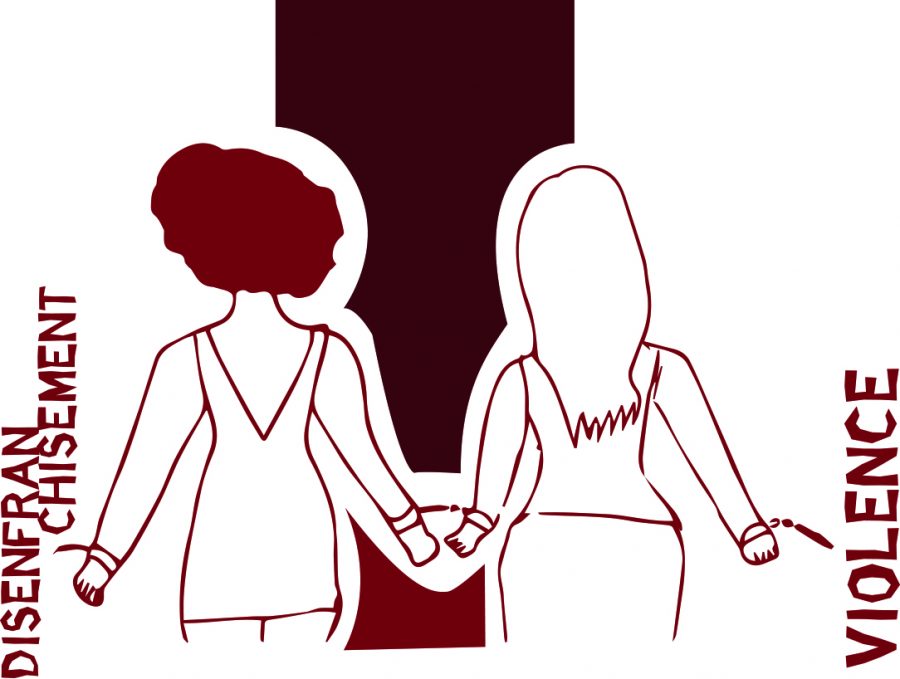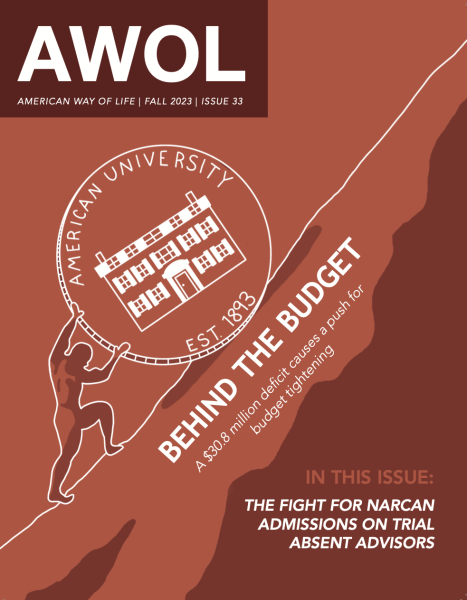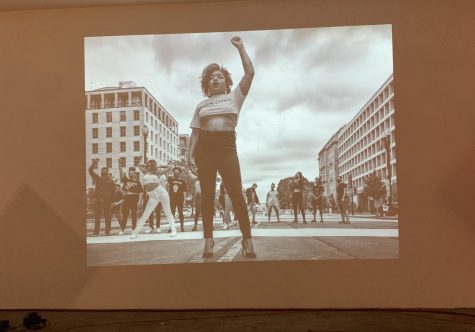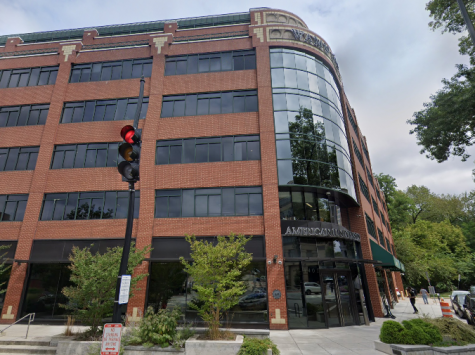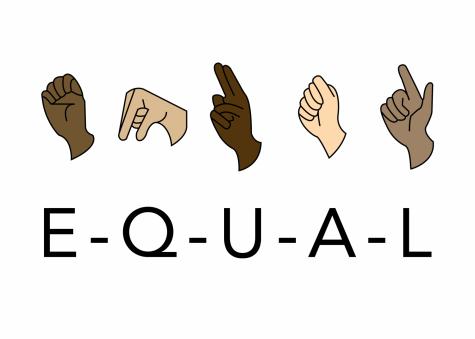The District At Dawn: Decriminalizing sex work in D.C.
Art by Chloe K. Li
In 2017, D.C. Council members at-large David Grosso and Robert C. White Jr. introduced the “Reducing Criminalization to Improve Public Safety and Health Amendment Act,” which would decriminalize and remove all criminal penalties for sex work in the D.C. area.
This law would decriminalize the buying and selling of sex in both public and private spaces in the district. This contrasts the Nordic Model approach to sex work, which has been adopted in countries like Norway and Sweden and only criminalizes those who purchase sex. While, sex trafficking would remain illegal in the district and the law will only cover consensual sex among adult sex workers and their clients.
Decriminalizing sex work could act as a way to make the District a safer place for sex workers. An Urban Justice Center report found that over 80 percent of street-based sex workers experience violence during their work.
“Following an Amnesty International report addressing how criminalization was not the best way to address sex work, I was encouraged by activists in D.C. to work to identify and promote the best ways to address the issues surrounding commercial sex,” Council member Grosso said.
The law would make D.C. the first city in the United States where sex work is decriminalized, other than Nevada, which has approximately 21 legal brothels. The legislation also establishes a task force to evaluate the effects of removing criminal penalties for commercial sex and to recommend other efforts to improve public health and safety for sex workers.
Penelope Saunders, coordinator at Best Practices Policy Project, a national organization dedicated to supporting people in the sex trade and related communities, said, “The task force is a vital part of the legislation because for three years, it evaluates if the new laws have the desired impact such as reducing violence against those who engage in sex work.”
Best Practices Policy Project and other progressive organizations in D.C. gathered together to form the Sex Workers Advocacy Coalition to offer their support to Grosso and help him develop this legislation. Grosso collaborated with multiple sex worker advocacy organizations in the District including HIPS, ACLU-DC, and Whitman Walker Clinic, among others to develop the legislation. .
“The task force gives voice to the community,” Council member Grosso said. “We want to involve diverse voices, including active and retired sex workers and communities where sex work is traditionally practiced.”
The only politicians running for office who have formally opposed the bill in a questionnaire are current Council Chair Phil Mendelson, mayoral candidate James Butler, and former D.C. Superior Court Judge and Ward 1 candidate Lori Parker.
Mayor Muriel Bowser has not made a definitive statement on the decriminalization law.
In a questionnaire administered by the Gay and Lesbian Activists Alliance, Council Chair Mendelson explained his opposition to the bill. He wrote that “there is a great deal of collateral crime associated with commercial sex work” and therefore, “now is not the time” for full decriminalization of sex work.
Mendelson did not respond to a request for comment, as his committee has yet to review the legislation.
Proponents of the legislation argue that the current criminalization of sex work only promotes violence and sexual exploitation while harming vulnerable communities, due in part to stigma and discrimination. A Sex Workers Advocacy Group report states that globally, sex workers have a 45 to 75 percent chance of experiencing sexual violence at some point in their careers and 32 to 55 percent chance of experiencing sexual violence in any given year.
Open Society Foundation also reports that criminalization of sex work has a greater negative impact on groups already facing discrimination, including communities of color, gay and trans people, people with disabilities, immigrants, and people with criminal convictions.
“Our society is made of institutionalized racism and bias,” Councilmember Grosso said. “Therefore, it is more likely that a person of color or a trans woman of color is arrested for commercial sex than a white individual.”
Many sex workers when faced with violence and abuse during their line of work neglect to turn to law enforcement due to fear of arrest or exploitation. An Alliance for a Safe & Diverse DC report states that in the District, one in five sex workers has been approached by police officers asking for sex.
Saunders said that police are often the perpetrators of abuses against sex workers. In areas that sex work is criminalized, police wield power over sex workers in the form of threats of arrest and public humiliation.
“Despite passing decriminalization laws, police may go on arresting people for other reasons like trespassing or continue to arrest people for commercial sex with little accountability,” she said.
Criminalization also makes it more difficult for sex workers to access non-judgemental health services. This is especially true for contraceptives, like condoms and STD testing. Sex workers often fear arrest if they carry condoms or negotiate condom usage with their clients.
“People who need condoms and other health services are constantly faced with policing,” Saunders said. “This law helps sex workers talk easily about these services [with clients] and not be fearful of carrying condoms and other resources for their work.”
Many sex workers also avoid state institutions, including those that provide health services, due to stigma and fear of arrest.
“This legislation can help sex workers take the precautions they need to protect their own health,” said Yvette Butler, director of policy and strategic partnerships at Amara Legal Center, which provides free legal services to individuals whose rights have been violated while involved in commercial sex.
A criminal record for sex work can also act as a barrier to government services and move away from sex work for employment.
“People involved in commercial sex, either by coercion, choice, or necessity, are often vulnerable,” Butler said. “A criminal record from sex work only makes them more vulnerable because then they cannot access housing, employment, and other resources.”
Many sex workers face issues surrounding housing, drug abuse and trauma. Saunders explained that with the passage of this legislation, the resources that previously went towards the policing and criminal enforcement of anti-prostitution laws can go towards resources for social services for sex workers and related communities, including the transgender community.
“Decriminalization is important because historically, the state has tried to control and regulate sex workers for the supposed benefit of society,” Saunders said. “Therefore, sex workers reject the idea of government control and overregulation through legalization of sex work [and prefer decriminalization].”
Advocates for sex workers argue that decriminalization empowers sex workers to make decisions about their own work and ways of obtaining income without government regulations.
Saunders said, “The term decriminalization is more of a political stance. We want to end criminalization of people’s everyday lives.”
Opponents of the legislation worry that it will promote sex trafficking and other human rights’ abuses against sex workers. However, the UNAIDS Guidance Note on HIV and Sex Work
highlights sex worker organizations as best positioned to refer women and children who are victims of trafficking to appropriate services.
Council member Grosso discussed how decriminalization could help the city by identifying and partnering with sex workers to “keep an eye out” and combat crime in the sex worker industry, especially regarding sex trafficking and minor involvement.
“[At Amara], we view our role as a nuanced educational look at how decriminalization could affect our clients,” Butler said. “There can be a push for more engagement between sex workers’ rights and anti-trafficking organizations.”
Council member Grosso is planning to reintroduce the legislation at the beginning of the next legislative session and is continuing to build his support and elevate the conversation surrounding decriminalization. This bill will make the District a national example of how change could potentially influence the lives of sex workers.
However, there is still more work to be done for the rights of sex workers in the District. Butler argued that more education is necessary to address assumptions and humanize the people involved in commercial sex.
“Society has tried to control sex workers at every level, and we need to be prepared for that,” Saunders said. “Decriminalizing sex work is not the end of the fight for sex workers’ rights; it’s the beginning.”
______________
Taylor Sabol is a senior studying public health.

I'm a Senior majoring in Public Health. My areas of interest include health equity, housing access, and criminal justice reform. I have always been a writer...

Chloe K. Li (she/her/hers) is a junior studying journalism and transcultural studies. She reports as much for the people as possible and believes that...


